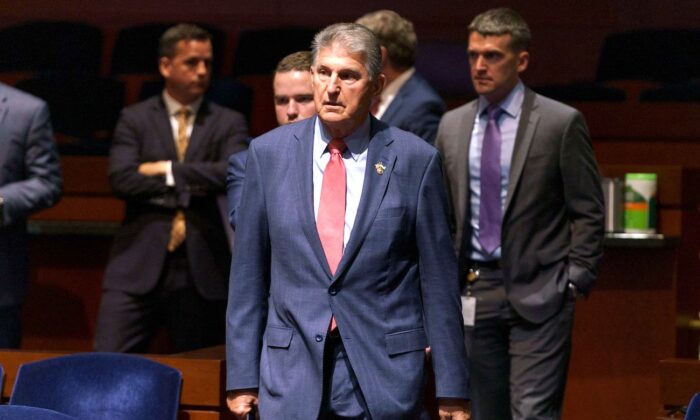Sen. Joe Manchin (D-W.Va.) announced on July 27 that he has reached a deal with Senate majority leader Chuck Schumer (D-N.Y.) on energy, taxes, and health care to advance what appears to be a revised, alternate version to the Build Back Better (BBB) bill.
The new spending package (pdf), now dubbed the “Inflation Reduction Act of 2022,” will “address record inflation by paying down our national debt, lowering energy costs, and lowering healthcare costs,” Manchin said in a lengthy statement.
“For too long, the reconciliation debate in Washington has been defined by how it can help advance Democrats political agenda called Build Back Better. Build Back Better is dead, and instead, we have the opportunity to make our country stronger by bringing Americans together,” he added.
Manchin, a crucial swing vote in the 50–50 split Senate, had for months refused to support the BBB pushed by fellow Democrats that at one point had asked for over $3 trillion in funding. In mid-July, he reportedly killed any hope for a scaled down version of the BBB, telling party leadership he would not support new climate spending or raise taxes from their post-2017 levels.
“The revised legislative text will be submitted to the Parliamentarian for review this evening and the full Senate will consider it next week,” Manchin and Schumer said in a joint statement on July 27.
Schumer seeks to pass the measure through a procedural tool that allows a bill related to taxes, spending, and debt to be passed in the chamber by a simple 51-vote majority rather than having to pass the 60 vote filibuster threshold. The process also limits debate on the bill to 20 hours. That could allow the bill to be passed with only Democratic votes, if necessary—if every Democrat is on board.
Hours after Manchin announced the deal, a spokesperson for Sen. Kyrsten Sinema (D-Ariz.), a moderate Democrat, told news outlets that her office does not have a comment on the proposed legislation and that she will need to review the text.
Bill Claims to Reduce Federal Deficits by $300 Billion
The two senators said the bill “will make a historic down payment on deficit reduction to fight inflation, invest in domestic energy production and manufacturing, and reduce carbon emissions by roughly 40 percent by 2030.” It will also allow Medicare to negotiate for prescription drugs and lower health care costs for Americans, they added.
A one-page summary (pdf) from Manchin’s office show that the deal will see a total of $433 billion in investments: about $369.75 billion in energy security and climate change programs over 10 years, and $64 billion to extend the expanded Affordable Care Act program for federal subsidies of health insurance, for three years through 2025.
The deal seeks to generate an estimated $739 billion in new revenue over the next 10 years. A large portion of the money—an estimated $313 billion—is expected to be generated by increasing the corporate minimum tax to 15 percent. The remaining amounts include $288 billion in prescription drug pricing reform; $124 billion in Internal Revenue Service tax enforcement; and $14 billion in closing the carried interest loophole.
That would leave over $300 billion to reduce federal deficits over the next 10 years to fight inflation, according to the Democratic senators. The government is projected to rack up trillions in cumulative deficits over the next 10 years.
“It is past time for America to begin paying down our $30 trillion national debt and get serious about the record inflation that is crushing the wages of American workers,” Manchin said in his statement. He said the proposed legislation “would dedicate hundreds of billions of dollars to deficit reduction by adopting a tax policy that protects small businesses and working-class Americans while ensuring that large corporations and the ultra-wealthy pay their fair share in taxes.”
President Joe Biden said in a statement that the proposed legislation “will reduce the deficit beyond the record setting $1.7 trillion in deficit reduction we have already achieved this year, which will help fight inflation as well.”
“And we will pay for all of this by requiring big corporations to pay their fair share of taxes, with no tax increases at all for families making under $400,000 a year,” he said. “This is the action the American people have been waiting for.”
Senate Minority Leader Mitch McConnell (R-Ky.) criticized the measure on Twitter.
“Democrats have already crushed American families with historic inflation. Now they want to pile on giant tax hikes that will hammer workers and kill many thousands of American jobs,” he wrote. “First they killed your family’s budget. Now they want to kill your job too.”

